Algae fuels are poised to redefine the energy landscape due to their exceptional oil yield potential, which can exceed traditional crops by up to 60 times per acre, alongside their ability to thrive in diverse environments like saltwater and wastewater. Their rapid growth—doubling biomass in just six hours—coupled with genetic engineering advancements enhances lipid accumulation and photosynthetic efficiency. Algae cultivation also presents significant environmental benefits, contributing to carbon neutrality by absorbing CO2, thereby promoting a circular carbon economy. As we explore investment trends, technological innovations, and future prospects, the implications for sustainable energy are profound.
Key Takeaways
- Algae can produce significantly more oil per acre than traditional crops, enhancing energy yield and resource efficiency.
- Their cultivation thrives in diverse environments, including wastewater, reducing land competition and promoting sustainability.
- Algae fuels contribute to carbon neutrality, absorbing CO2 and mitigating industrial emissions during growth.
- Technological innovations, such as genetic engineering, improve lipid accumulation and reduce production costs, making algae fuels more competitive.
- The global biofuel market is projected to grow significantly, attracting investment and increasing the economic viability of algae fuels.



Algae as a Renewable Resource
When we think about renewable resources, algae stands out as an incredibly promising option for biofuel production. Algae can produce up to 60 times more oil per acre than traditional land-based crops, reflecting its remarkable efficiency as a renewable resource. Its ability to thrive in diverse environments, including saltwater and wastewater, allows for sustainable cultivation without competing for arable land. Additionally, high-yield strains of algae can double in biomass in just six hours, showcasing their rapid growth potential. By considerably reducing carbon emissions and dependence on fossil fuels, algal biofuels align with global climate change mitigation efforts. The economic viability of algae is further enhanced through innovative technologies like genetic engineering, which improves photosynthetic efficiency and biomass productivity, solidifying its role in a sustainable future.
Production Methods of Algae Fuels
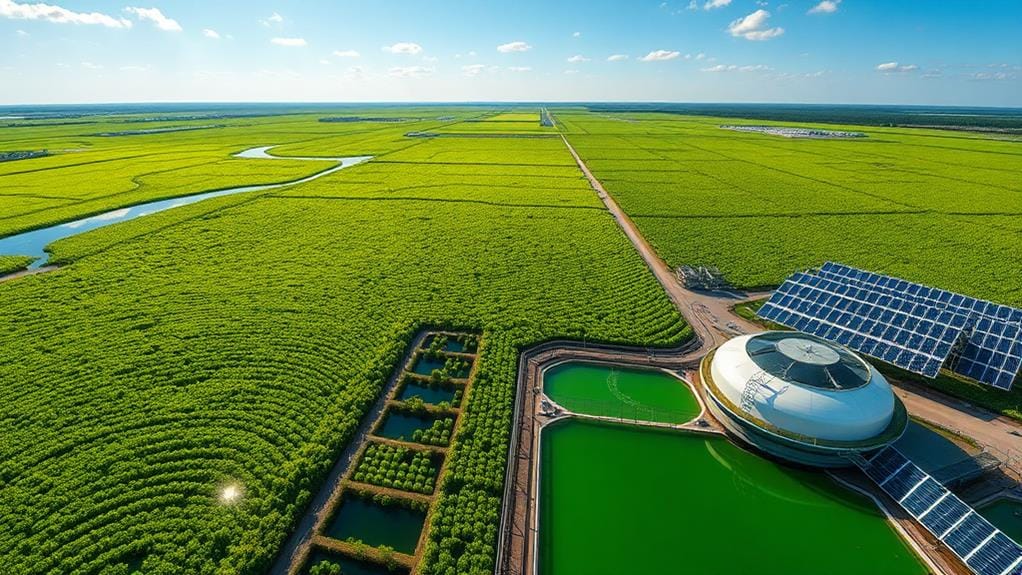
In recent years, innovative production methods have emerged to maximize the efficiency of algae fuels. Algae biofuel production now incorporates advanced techniques like genetic engineering to enhance lipid accumulation, achieving lipid concentrations that are double those found in natural strains. Integrated biorefineries streamline algal cultivation, harvesting, and refining processes, as evidenced by Sapphire Energy’s facility targeting 1 million gallons annually. While harvesting methods, such as centrifugation and flocculation, are essential, they often incur high energy costs, prompting the need for more efficient extraction techniques. Significantly, new processes developed by the Pacific Northwest National Laboratory can convert algae into oil in under an hour, drastically reducing time and energy requirements, ultimately enhancing the commercial viability of sustainable alternatives in clean energy.
Economic Viability of Algal Biofuels
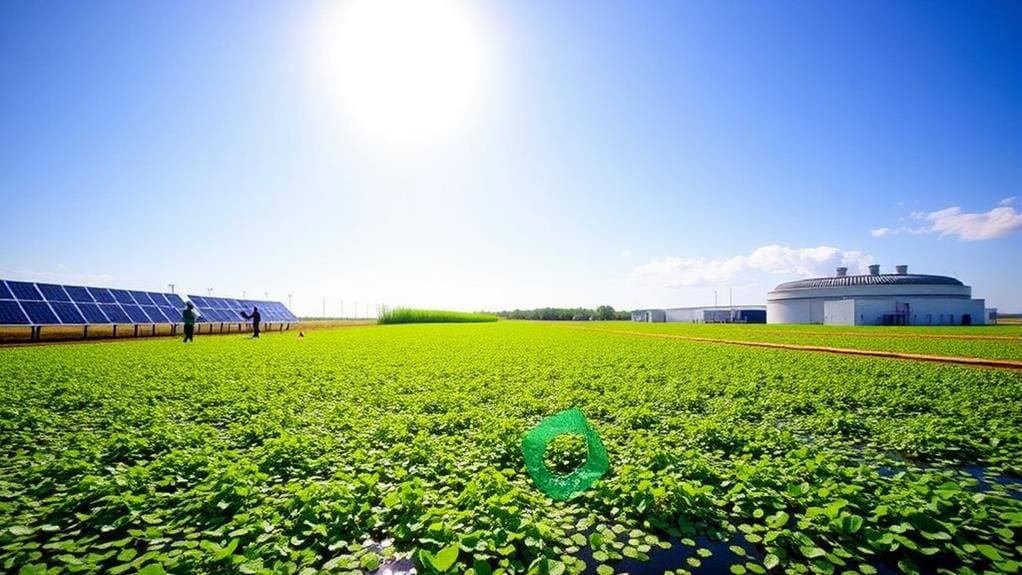
As we explore the economic viability of algal biofuels, it is crucial to analyze production costs in comparison to traditional fossil fuels, noting that current algae fuel prices range from $300 to $2600 per barrel, starkly contrasting with petroleum’s $40 to $80 per barrel. Additionally, market demand trends indicate a projected biofuel market worth $247.38 billion by 2024, suggesting a significant appetite for alternative energy solutions, which could benefit algal biofuels if we can enhance production efficiencies. Finally, investment opportunities are expanding, particularly in higher-value algae products, as stakeholders seek to navigate the challenges of mass-scale production while capitalizing on potential profitability.
Cost-Effectiveness Analysis
The economic viability of algal biofuels presents a complex landscape that we must navigate carefully. While algal biofuel production costs currently range from $300 to $2600 per barrel—significantly higher than conventional petroleum prices of $40 to $80—specific regions have demonstrated potential for lower costs, with estimates as low as $84 per barrel. However, the substantial initial investments required for algae cultivation and processing facilities, along with the energy-intensive biodiesel production process, challenge the cost-effectiveness of this renewable fuel source. Despite these barriers, the global biofuel market‘s projected growth to $247.38 billion by 2024, coupled with the International Energy Agency’s forecast of biofuels contributing 6% of total fuel use by 2030, underscores the necessity for continued innovation to enhance economic viability.






Market Demand Trends
There’s a noticeable shift in market demand trends favoring algal biofuels, driven by the increasing need for sustainable energy solutions. As we navigate a future that prioritizes renewable energy, we can identify key factors influencing this change:
- The global biofuel market is projected to reach $247.38 billion by 2024, indicating significant growth.
- With the rise in fossil fuel prices, algal biofuels present a viable alternative, especially as domestic production becomes more attractive.
- The International Energy Agency forecasts that biofuels, including those from algae, could account for 6% of total fuel use by 2030.
These trends highlight that, despite current production costs ranging from $300 to $2600 per barrel, the environmental benefits and potential for lower future costs make algal biofuels a compelling choice for sustainable energy sources.
Investment Opportunities Overview
With a growing emphasis on sustainable energy solutions, investment opportunities in algal biofuels are becoming increasingly attractive. The production costs of algal biofuels currently range from $300 to $2600 per barrel, presenting a premium pricing opportunity in a market projected to reach $247.38 billion by 2024. Companies like Reliance Industries are strategically entering this sector, showcasing the economic viability of these alternatives to fossil fuels. In addition, advances in genetic engineering have enhanced algae productivity, which could lead to reduced costs and increased profitability. As the International Energy Agency forecasts that biofuels could contribute up to 6% of total fuel use by 2030, we can see the significant market growth potential for algal biofuels, making them a compelling investment opportunity.
Environmental Benefits of Algae Fuels

As we explore the environmental benefits of algae fuels, it’s important to recognize their significant potential for carbon neutrality, which plays a vital role in reducing greenhouse gas emissions. Algae, through their rapid growth and ability to absorb carbon dioxide during photosynthesis, present a viable solution for mitigating climate change impacts, thereby aligning with global sustainability goals. Additionally, unlike traditional biofuels derived from food crops, algae cultivation minimizes land competition and can thrive in varied environments, enhancing both ecological balance and resource conservation.
Carbon Neutrality Advantage
Algae fuels present a remarkable opportunity for achieving carbon neutrality and enhancing our environmental efforts. By harnessing the unique capabilities of algae, we can considerably reduce greenhouse gas emissions while promoting a sustainable future. Here are three key benefits:
- Carbon Absorption: Algae absorb carbon dioxide during their growth, effectively mitigating industrial emissions and contributing to carbon neutrality.
- Circular Carbon Economy: By utilizing waste CO2 from industrial processes, algae biofuels help create a circular carbon economy, transforming emissions into valuable energy sources.
- Resource Efficiency: Algae thrive in non-arable environments, reducing our dependency on fossil fuels and preserving freshwater resources typically used in food production.
Together, these advantages position algae biofuels as a cornerstone of environmental sustainability and a critical element in our journey towards a greener planet.
Reducing Greenhouse Gas Emissions
The environmental advantages of algae fuels extend beyond carbon neutrality; they play an essential role in reducing greenhouse gas emissions. By utilizing microalgae, we can effectively lower CO2 emissions by up to 80% compared to traditional fossil fuels, considerably shrinking our carbon footprint. Algae biofuels thrive on carbon dioxide, converting it into biomass and oxygen, thereby facilitating carbon-neutral energy production. In addition, the cultivation of these organisms can utilize waste CO2 from industrial processes, effectively recycling emissions and mitigating their environmental impact. Importantly, algal fuels don’t compete with arable land for food production, supporting sustainable energy generation without threatening food security. As we align with global climate change mitigation efforts, algae biofuels represent a promising shift towards renewable energy sources that reduce our reliance on fossil fuels.
Technological Innovations in Algae Production
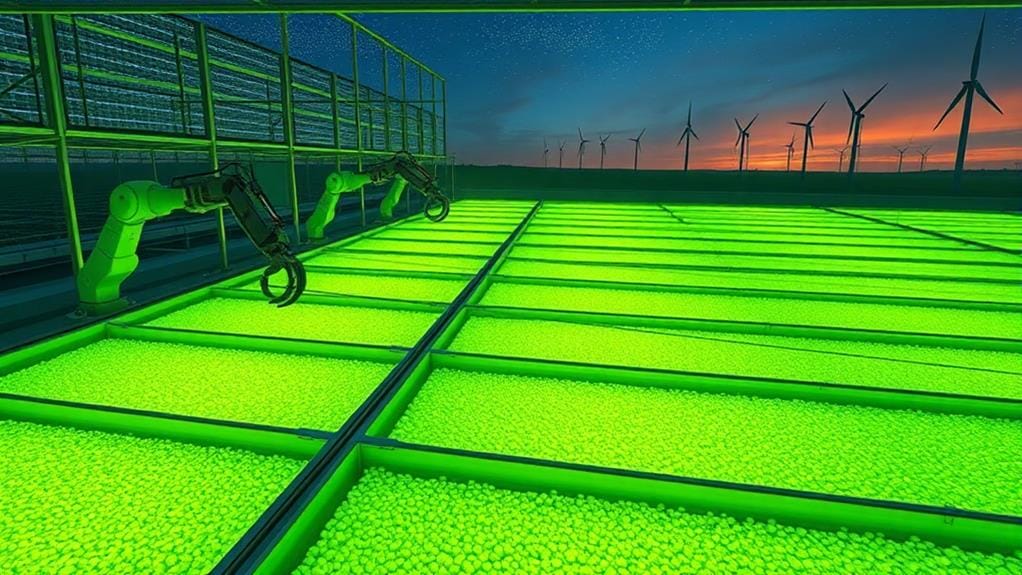
In recent years, we’ve witnessed remarkable technological innovations in algae production that promise to revolutionize biofuel efficiency. These advancements not only enhance the production process but also improve the economics of algae biofuels production. Notable developments include:
- Genetic engineering techniques that have doubled lipid concentrations in algae, greatly increasing lipid production.
- A rapid conversion method developed by the Pacific Northwest National Laboratory, which transforms algae into oil in under an hour, streamlining costs.
- The integration of artificial intelligence to optimize growth conditions, enhancing light exposure and density for improved biomass productivity.
Together, these innovations facilitate large-scale production and set the stage for a sustainable energy future centered around algae biofuels, making them a key player in our renewable energy landscape.
Challenges in Scaling Algae Biofuel
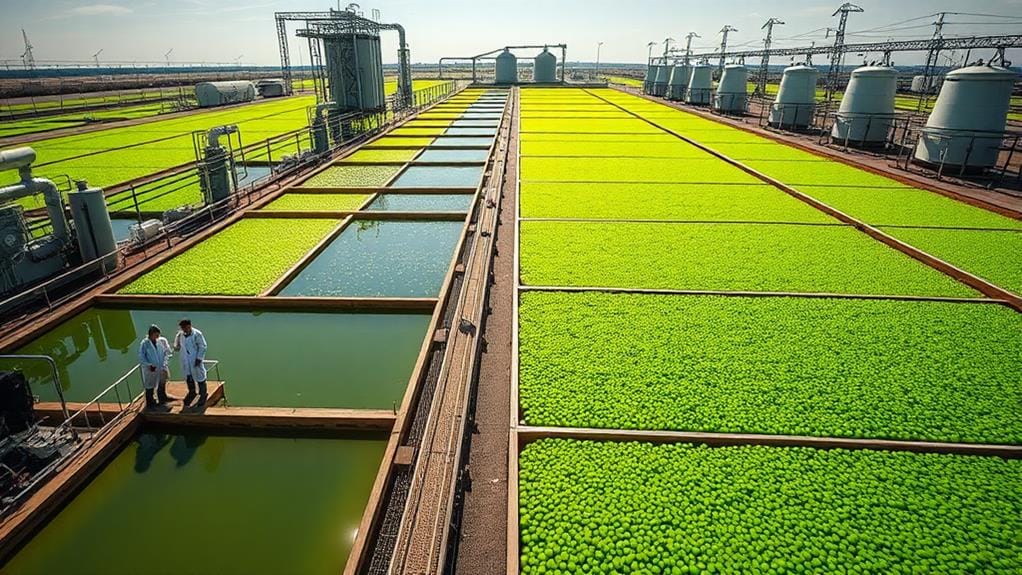
Scaling algae biofuel production poses significant challenges that we must address for it to become a viable alternative to fossil fuels. The current production costs range from $5 to $8 per gallon, making it uncompetitive against fossil fuels priced at $40 to $80 per barrel. Achieving ideal growth conditions for algae requires meticulous maintenance of nutrient availability and light exposure, which complicates our efforts. Additionally, harvesting methods, such as centrifugation and flocculation, incur high energy costs, complicating profitability. Contamination risks from other organisms further hinder our production efficiency. Finally, substantial infrastructure investment is necessary for large-scale cultivation, which remains a barrier to commercial viability.
| Challenge | Description | Impact on Production |
|---|---|---|
| High Production Costs | $5 to $8 per gallon, uncompetitive | Limits market adoption |
| Contamination Risks | Threat from other organisms | Reduces yields and profits |
| Infrastructure Investment | Capital needed for large-scale cultivation | Hinders scalability |
Investment Trends in Algal Biofuels
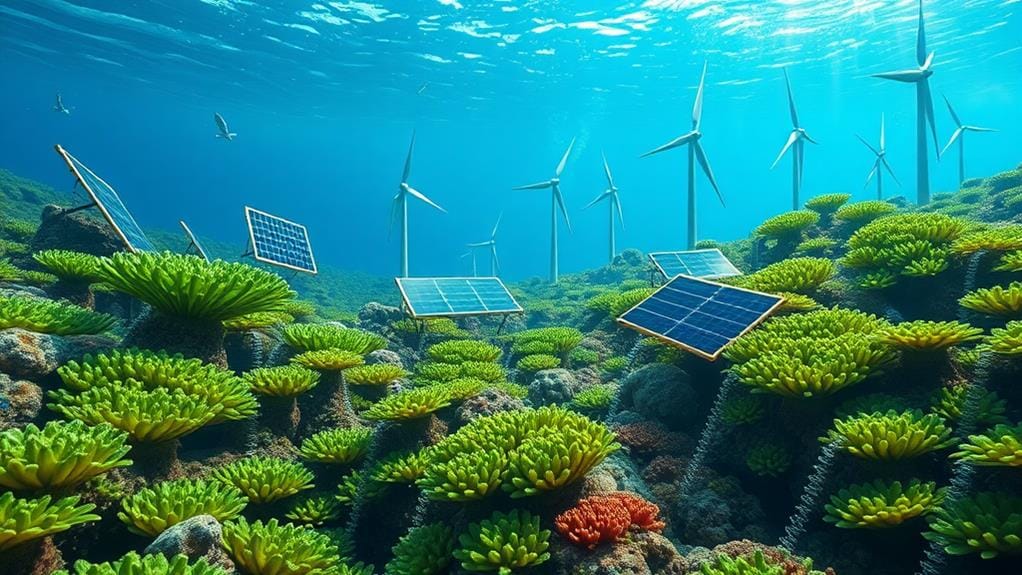
Investment trends in algal biofuels reveal a promising landscape for both established corporations and innovative startups. We’re witnessing a surge in investment opportunities, driven by several key factors:
- Corporate interest from giants like Reliance Industries and Exxon, affirming the sector’s potential profitability and sustainability.
- Emerging startups are enhancing the market, with projections indicating a positive trend for algae companies by 2025-2026.
- Successful crowdfunding campaigns—such as Manta Biofuel’s in 2021—highlight the growing investor interest and the economic viability of algal biofuels, bolstered by advancements in production efficiency and genetic engineering.
As we navigate this evolving landscape, we can feel the excitement of a community rallying around a sustainable future.
Future Prospects for Algae Energy

The momentum building around algal biofuels sets the stage for an exciting future in algae energy. As advances in genetic engineering enhance lipid concentrations, we can expect significant improvements in oil yield, making algal biofuels more economically viable. Research shows that algae can produce up to 60 times more oil per acre than traditional crops, underscoring their remarkable efficiency as a renewable energy source. Integrated biorefineries, like Sapphire Energy’s in New Mexico, are scaling production, targeting 1 million gallons annually, which illustrates the feasibility of large-scale algal biofuel production. The International Energy Agency projects that biofuels, including algae-based fuels, could contribute 6% of total fuel use by 2030, revealing the immense potential of algae cultivation in our energy landscape.









Frequently Asked Questions
Does Algae Fuel Have a Future?
As we gaze into the future, algae fuel shines like a beacon. With technological advancements and growing market demand, we can overcome scalability challenges, ensuring its economic viability while embracing the environmental benefits that unite us all.
What Are Some of the Reasons Why Algae Fuel Is a Good Idea?
We believe algae fuel’s a great idea due to its sustainability benefits, carbon capture, and resource efficiency. With advanced cultivation methods and economic viability, it offers impressive energy density through technological advancements, making it a smart choice together.
Why Is Algae a Good Potential Replacement for Traditional Fuels?
Imagine a garden thriving with life, where sustainable production flourishes. Together, we can harness algae’s energy density, benefiting from advanced cultivation methods, reducing environmental impact, capturing carbon, and ensuring economic viability for our shared future.
Why Is Algae Good for Making Renewable Energy?
We see algae as a fantastic source for renewable energy. Its sustainability benefits, economic viability, and energy efficiency, combined with technological advancements in cultivation methods, enhance carbon capture and reduce environmental impact. Let’s embrace this potential together!




